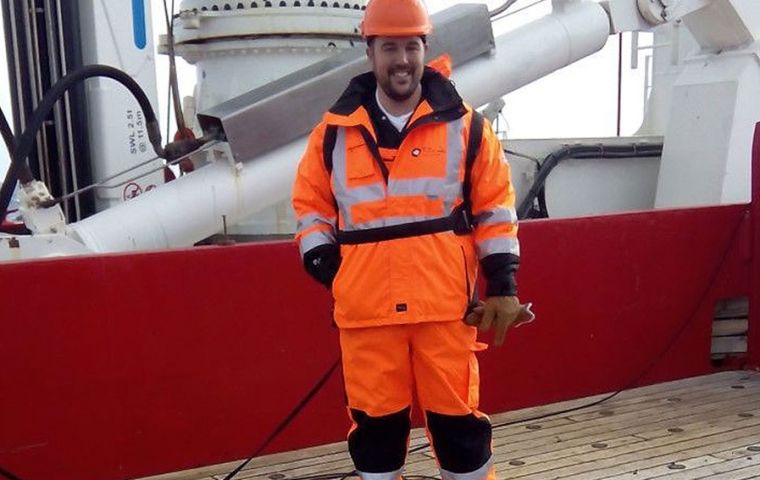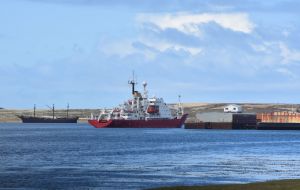MercoPress. South Atlantic News Agency
Falklands: First surveys of the Burdwood Bank completed for Marine Managed Areas Project
 Dr. Ander de Lecea with an Agassiz trawl (see lin) about to be deployed on the Burdwood Bank
Dr. Ander de Lecea with an Agassiz trawl (see lin) about to be deployed on the Burdwood Bank  RRS James Clark Ross in Stanley. In early December 2018 Dr de Lecea and Dr Costa boarded the JCR, and made their way down to the Burwood Bank.
RRS James Clark Ross in Stanley. In early December 2018 Dr de Lecea and Dr Costa boarded the JCR, and made their way down to the Burwood Bank. By Ander M. de Lecea - Research scientist Drs Ander de Lecea and Marina Costa of SAERI recently completed their first surveys of the Burdwood Bank, kicking off the “Fine Scaling of the Marine Management Areas of the Falkland Islands” (MMA) project.
The Burdwood Bank is an area known to be important for seabirds and mammals, and believed to house high benthic biodiversity, however there are still large gaps in our understanding of its role in supporting the rich fisheries and charismatic marine life of Falklands waters. This areas is also likely to be very important in the face of ongoing climate change; because it’s located at the southern edge of the continental shelf, it’s the ‘last stop’ for many species who’s ranges are shifting South with warming sea temperatures.
Beyond this, the ocean plummets to great depths, which some species cannot survive and/or cross. Being able to understand an ecological baseline for the region should help us to better understand it and manage it, as it will allow us to identify any ecosystem shifts in the long run. The Bank is also thought to be important for blue carbon ecosystem services, meaning that the area may help to trap greenhouse gases from the atmosphere over long periods of time and store them.
From other areas that perform these vital services, we know that destroying these ecosystems could mean lower capacity for the oceans to store carbon in the long term, which could have further implications for climate change.
The Burdwood Bank is obviously quite far South in an area of rough and challenging seas, so the British Antarctic Survey, as a partner in the project, has helped to make research on the Burdwood Bank a reality.
In early December 2018 Dr de Lecea and Dr Costa boarded the RRS James Clark Ross (JCR), and made their way down to the Bank. There they deployed scientific equipment, including a high-resolution multibeam ecosounder and TOPAS (sub-bottom profiler) to map the sea floor, and mini Agassiz Trawls to collect animals from depths of 400m to 1300 m for study. They have mapped a 6,096.44 km2 area at high definition and collected over 365 different samples with much work to do on counting and identifying species. with collaborations experts at BAS (UK) and at the Italian National Antarctic Museum in Genoa, Italy, who will being doing identifications through genetic analyses. We hope to have some new species discovered and named!
This Darwin-Plus funded project lead by SAERI builds on previous work of the Marine Spatial Planning within the Falkland Islands, which was first explored during 2014-2018. Following its successful conclusion Falkland Island Government contracted SAERI to undertake a second phase (MSP Phase II; July 2017 to December 2017) which covered three key aspects including an Assessment of Fishing Closure Areas as Sites (AFCAS) as potential marine management areas (MMAs) against international criteria for Marine Protected Areas.
Three areas were identified including the Burdwood Bank, Beauchêne Island and the inshore waters. In order to consider their implementation, the current Darwin-Plus MMA project sets out to conduct key baseline work required for their effective design and management. Five steps have been identified; development of 1) economic consequences of any design (present and future), 2) Policy formulation, 3) Site Management Plans, 4) Suggested legislative framework and 5) Legacy Planning (resourcing, financial, human). Thanks to this key information gained on this first research cruise, we will be able to make the most of a longer research trip on the JCR in summer 2019/2020, that will include seabed photography, more seabed mapping, and species sampling of this dynamic feature of the Falklands marine ecosystem.
On March first Marina and Ander gave a talk about their work on the Burwood and trip to Antarctica at Stanley's Dockyard Museum. During the talk they also showed some of the organisms that they collected there, and sharing their experience on the JCR and with British Antarctic Survey on their ICEBERGS2 project in Antarctica. The researchers thank the Darwin Initiative for the funding support via their Darwin+ scheme and the Falkland Island Government via the Environmental Studies Budget scheme. Thanks also go to the Falkland Island Government, Shallow Marine Surveys Group (SMSG) and the British Antarctic Survey for their support.




Top Comments
Disclaimer & comment rules-

Read all commentsArgentina claims economic rights over the whole of the bank, while the United Kingdom has designated about half of the bank as part of the Falklands Outer Economic Zone.
Mar 11th, 2019 - 07:04 pm 0British Sub-Antarctica and Antarctic Islands – Argentinian Claims (2 pgs):-
https://www.academia.edu/38179055/British_Sub-Antarctica_and_Antarctic_Islands_Argentinian_Claims
Commenting for this story is now closed.
If you have a Facebook account, become a fan and comment on our Facebook Page!